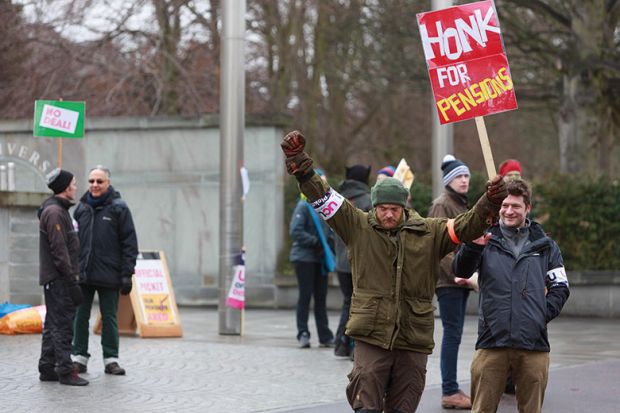Tributes to Sally Hunt came thick and fast after the University and College Union’s general secretary resigned, having served 12 years in the role.
Labour MPs, trade union bosses and some of the UCU’s 120,000 members took to Twitter to praise Ms Hunt’s leadership, particularly how she steered the union through the biggest strike action in UK academic history.
But many UCU members had become dissatisfied with Ms Hunt’s leadership, claiming that she was holding too much power in what should be a member-led union; last year’s congress descended into chaos after Ms Hunt led repeated walkouts to prevent the discussion of a motion calling for her “resignation…with immediate effect”.
That dispute, and Ms Hunt’s departure for health reasons, should be a moment to reassess the position of the general secretary, some believe. To that end, a democracy commission, established at June’s conference, is set to recommend that the UCU’s top official be subject to an early election if two-thirds of congress agree.
“It is something we will ensure can be used only in exceptional circumstances and it would be unhealthy if we used it a lot, but there is a feeling that the general secretary is beyond the democratic control of members,” said Sam Morecroft, a UCU branch officer at the University of Sheffield, who proposed the commission and is now serving on it.
“I think it would make the general secretary more receptive to the views of our membership,” he added.
Shortening the term of office from five to three years – an alternative proposal – might also encourage more rank-and-file union members to consider running, rather than having the role filled by professional trade union officials, said Mr Morecroft. “I’m a big believer in lay representation – we need to create the idea that this is not a permanent job and if members decide they do not want you, you go back to what you were doing,” he added.
One such career trade union official, Matt Waddup, the UCU’s head of campaigns and policy, is the front-runner to succeed Ms Hunt.
But it is likely that the UCU Left group will field a candidate, having recently seen Nita Sanghera and Liz Lawrence elected as vice-presidents. A third candidate – possibly from the USSbriefs pension activist collective, which fielded candidates for national executive committee seats – could also emerge.
On 1 March, however, the union’s national executive committee agreed that Ms Hunt’s successor should be elected before this year’s congress in Harrogate at the end of May, which would not give time for the commission’s findings to be adopted and applied to the new general secretary.
Delaying the election would, however, have meant the UCU went leaderless into a period in which crucial decisions on pay, pensions and Brexit will be made, said Emma-Jane Phillips, a UCU national officer from Northumbria University, who observed that the union has been without a general secretary since Ms Hunt first took leave in October on health grounds.
“For the stability of the union, we need to have a general secretary in place as soon as possible, which is before congress,” said Ms Phillips, who added that “waiting for congress.
Terry Murphy, UCU branch chair at Teesside University, also questioned the make-up of the democracy commission, saying that its members were “picked by the small minority of people who attended the most disruptive congress since the UCU was started”.
“It makes sense for the UCU after 12 years to review its democracy, but this commission seems obsessed with how to get rid of general secretaries above all else,” he said.
A broader look at the UCU’s democracy should include the greater use of online surveys of members, which would empower rank-and-file members, rather than concentrate power in the hands of those who attend congress, said Dr Murphy.
The UCU’s recent failure to hit the 50 per cent turnout threshold required for strike action, in a ballot on pay, suggested that the militancy of many activists was out of step with most members, Dr Murphy added.
“We have to make them feel included in the union, but the revolutionary language used by many activists just alienates people,” he said.
Three-year terms of office would also be a bad move, Dr Murphy argued. “We need to look at the evidence, which suggests that paid officials would be pushed to spend half their term canvassing for re-election like American sheriffs, and thus to focus inevitably on the bigger, richer branches with more delegates,” he insisted.
“That would really disadvantage smaller branches, particularly further education ones, where members are under the most pressure.”
POSTSCRIPT:
Print headline: Soul-searching time for UCU after long-time leader exits
Register to continue
Why register?
- Registration is free and only takes a moment
- Once registered, you can read 3 articles a month
- Sign up for our newsletter
Subscribe
Or subscribe for unlimited access to:
- Unlimited access to news, views, insights & reviews
- Digital editions
- Digital access to THE’s university and college rankings analysis
Already registered or a current subscriber? Login









